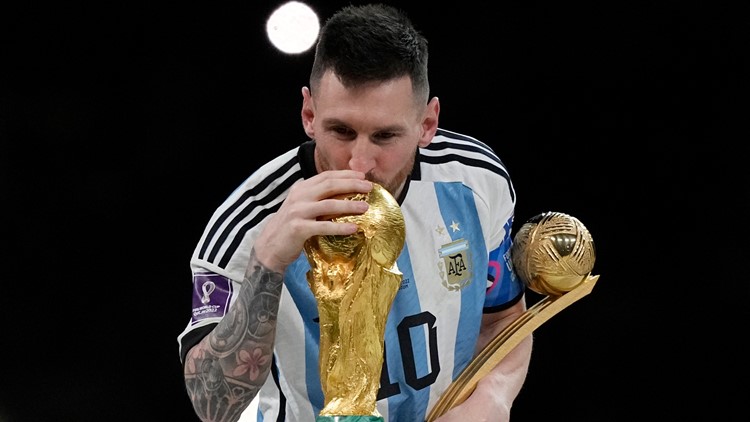MIAMI — Lionel Messi has pulled off his latest stunning feat: He is headed to Major League Soccer, and joining Inter Miami.
After months — years, even — of speculation, Messi finally revealed his decision to join a Miami franchise that has been led by another global soccer icon, David Beckham, since its inception but has yet to make any real splashes on the field.
He follows a lengthy list of other soccer legends who have made their way to play in the U.S., including Pele, Thierry Henry, Zlatan Ibrahimovic and Kaka just to name a few.
Sure, Messi coming to South Florida puts his name at the top of the list of most exciting players to play in MLS, but where does the Argentine legend rank among the greatest soccer players of all time? Let's take a look.
The debate of deciding who the greatest soccer player of all time will always change as years go by and future generations are introduced. There have also been countless great soccer players to have come and gone.
For the sake of this article, we'll be comparing Messi to one particular player in his generation who has been called the greatest as well, while also looking back at two other late legends who were the best in their day.
Messi has had a legendary career so far by scoring more than 800 goals and catching the eyes of many sports fans with his elite dribbling skills. The former FC Barcelona forward was awarded the Ballon d'Or — a trophy given annually to the best player in the world — seven times, the most of any player in history. His current stats can be seen below:
- La Liga (Spanish first division league): 474 goals in 520 games
- Champions League: 129 goals in 163 games
- Ligue 1 (French first division league): 22 goals in 58 games
- Argentina national team: 102 goals in 174 games
Let's put those numbers to the test and see how he lines up against other great players.
For nearly the past two decades, soccer fans across the world have pinned the rivalry of Messi against Portuguese star Cristiano Ronaldo.
Both players are without a doubt the best players in their generation, but which out of the two tops the other?
Trophies-wise, Messi ups Ronaldo by 42 to 32, including his recent World Cup glory in Qatar last year — a feat that Ronaldo has never accomplished.
Ronaldo’s numbers are listed below:
- La Liga: 311 goals in 292 games
- English Premier League: 103 goals in 236 games
- Champions League: 140 goals in 183 games
- Serie A (Italian first division league): 81 goals in 98 games
- Liga Portugal: 3 goals in 25 games
- Saudi Pro League: 14 goals in 16 games
- Portugal national team: 122 goals in 198 games
Ronaldo has the most Champions League titles compared to any other player and has won trophies in four different countries, but Messi being able to say he has put his hands on the World Cup trophy gives him the edge in this battle.
Two other players before Messi's time who have been regarded as the greatest ever are the late Brazilian forward Pele and Argentine forward Diego Maradona.
Many pundits and fans will agree Pele helped generate the sport to a global scale despite never playing for a European team, whereas Maradona's skills and success in Europe launched his legacy.
Stats from Pele's career are not fully recorded, but according to the Guinness World Records, he scored 1,279 goals in his career.
Maradona's numbers can be seen below:
- Serie A: 81 goals in 187 games
- La Liga: 27 goals in 62 games
- Argentina national team: 34 goals in 91 games
Pele has won more World Cups — three — than Messi and Maradona who have combined for two World Cup medals.
Although Pele has more World Cups to his name, not being able to play in Europe, which was a tough thing to accomplish for players in the Americas at the time, slightly pushes him behind the two Argentinians.
Between Messi and Maradona, the final verdict has to go to Messi based on his goal numbers.
Final rankings
- Messi
- Maradona
- Pele
- Ronaldo
Messi will now look to add more numbers to his goal count in Miami when he eventually links up with his new team, who currently sits last in the Eastern Conference and just fired its coach. Inter Miami CF has made the playoffs in two of its first three seasons but has yet to finish a season with a winning record or even a positive goal differential.
Messi’s next matches are likely to be exhibitions with Argentina against Australia on June 15 in Beijing and at Indonesia in Jakarta four days later — and then his Inter Miami debut figures to be sometime in July.
At 35, Messi has nothing left to prove in the game and filled the only significant unchecked box on his resume back in December by leading Argentina to the World Cup title.
The Associated Press contributed to this report.



